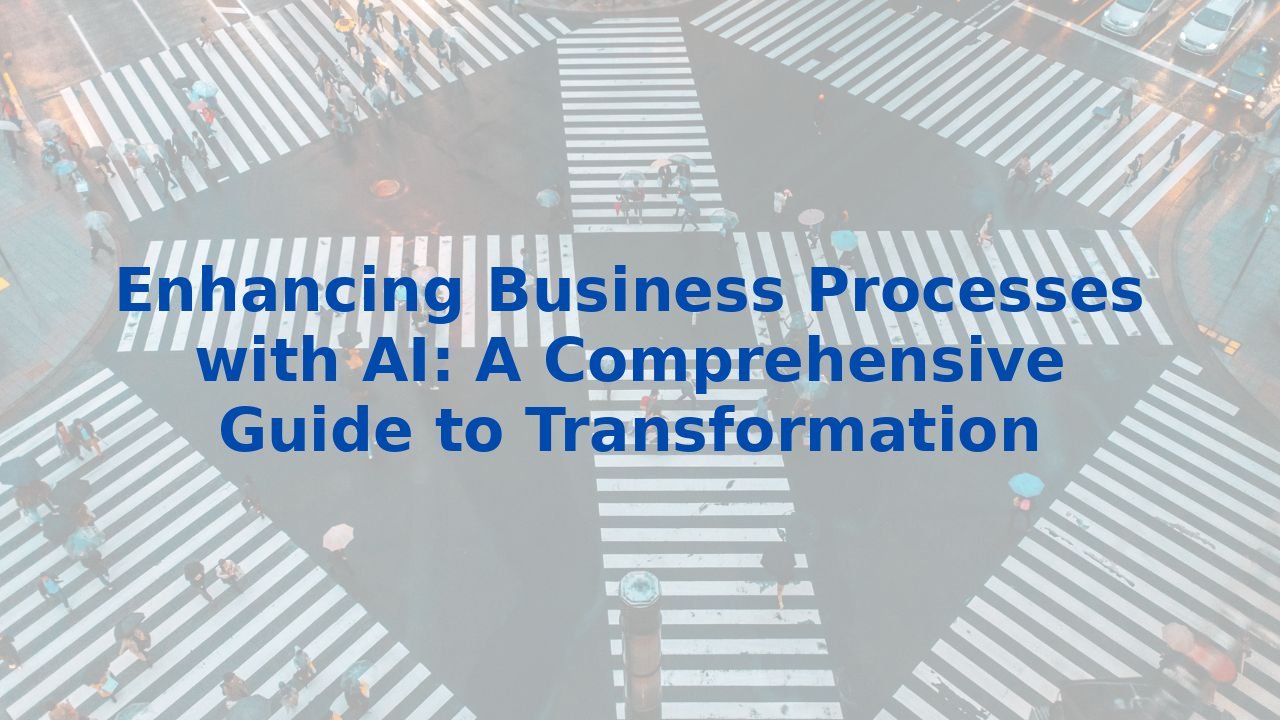Enhancing Business Processes with AI: A Comprehensive Guide to Transformation
Enhancing Business Processes with AI: A Comprehensive Guide to Transformation
Introduction
In an era marked by rapid technological advancement, businesses find themselves at a critical juncture. The demand for increased efficiency and streamlined operations has never been greater. Enter artificial intelligence (AI)—a transformative force reshaping the landscape of business processes. This guide explores the multifaceted ways AI can elevate operations, driving towards enhanced efficiency within organizations.
Understanding Business Process Management
At its core, Business Process Management (BPM) is about understanding and optimizing the workflows that power an organization. It involves a systematic approach to managing processes, including discovery, mapping, automation, and continuous improvement. Unfortunately, traditional BPM often relies heavily on manual data analyses and employee insights, which opens the door to inefficiencies and errors.
How AI Enhances Business Processes
AI stands as a catalyst in enhancing BPM, enabling organizations to automate mundane tasks, elevate decision-making, and leverage advanced analytics for optimization. Here are several key areas where AI creates a profound impact:
1. Process Discovery and Mapping
AI-driven techniques such as process mining and pattern recognition allow organizations to uncover existing processes with remarkable accuracy. This innovative approach results in the creation of precise process maps that spotlight inefficiencies often overlooked by traditional methods.
2. Process Automation
Imagine freeing your team from the burden of repetitive tasks. By employing AI bots, organizations can automate manual activities—like document processing—ensuring they become swift, reliable, and free from human-induced errors. This not only speeds up operations but also liberates talent for more impactful undertakings.
3. Decision-Making
AI revolutionizes decision-making by harnessing data to provide predictive insights. By analyzing patterns across vast datasets, AI equips analysts with robust simulations and tangible outcomes, all of which contribute to more informed, objective decisions.
4. Continuous Improvement
The journey doesn't stop with initial implementation. AI fosters a culture of continuous improvement, offering ongoing feedback and data-driven recommendations that keep BPM strategies dynamic. This guarantees alignment with both organizational goals and industry standards.
Benefits of AI in Business Processes
The integration of AI isn’t just a trend; it brings tangible benefits to the table, including:
- Improved Efficiency: By automating routine tasks, AI enables employees to devote their efforts towards strategic initiatives that drive growth.
- Enhanced Decision-Making: Data-driven insights promote better-informed decisions, propelling organizations towards success.
- Reduced Errors: With AI managing repetitive tasks, the occurrence of errors diminishes significantly, resulting in smoother operations.
- Real-Time Monitoring: AI provides organizations the capability to monitor processes in real-time, allowing for prompt interventions when necessary.
AI Applications Across Various Processes
The potential of AI spans across a vast array of business processes, be they core, support, or longtail processes. Here are some noteworthy applications:
- Core Processes: From production to marketing, AI-driven automation optimizes every line of the value chain.
- Support Processes: Streamline functions like IT service management and recruiting with AI’s smart capabilities.
- Longtail Processes: Even niche tasks such as vendor approval and document management can be refined through targeted AI applications.
The Role of Employee Training in AI Integration
While the technology of AI is undeniably powerful, its effectiveness hinges on the human element. Employee training is paramount in this transformative journey.
- Understanding AI Capabilities: Employees need a foundational knowledge of AI and its potential to optimize core processes.
- Data Analysis Skills: The ability to interpret the insights from AI is critical, necessitating some level of data literacy among staff.
- Adaptability: As AI technologies evolve, so too must employee adaptability to maintain seamless workflows.
- Continuous Learning: Embracing AI involves ongoing training to stay updated with emerging technologies and their applications.
Conclusion
AI is not just a buzzword; it's the backbone of modern business transformation. By enhancing business process management through automation, improved decision-making, and continuous feedback, organizations are realizing unprecedented levels of efficiency and productivity. As this landscape continues to evolve, it’s vital to equip your workforce with the skills necessary to thrive in an AI-driven world. Those who embrace this challenge will not only maintain their competitive edge but will also unlock pathways to sustained success well into the future.



